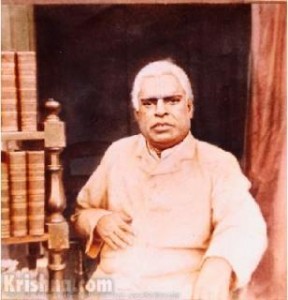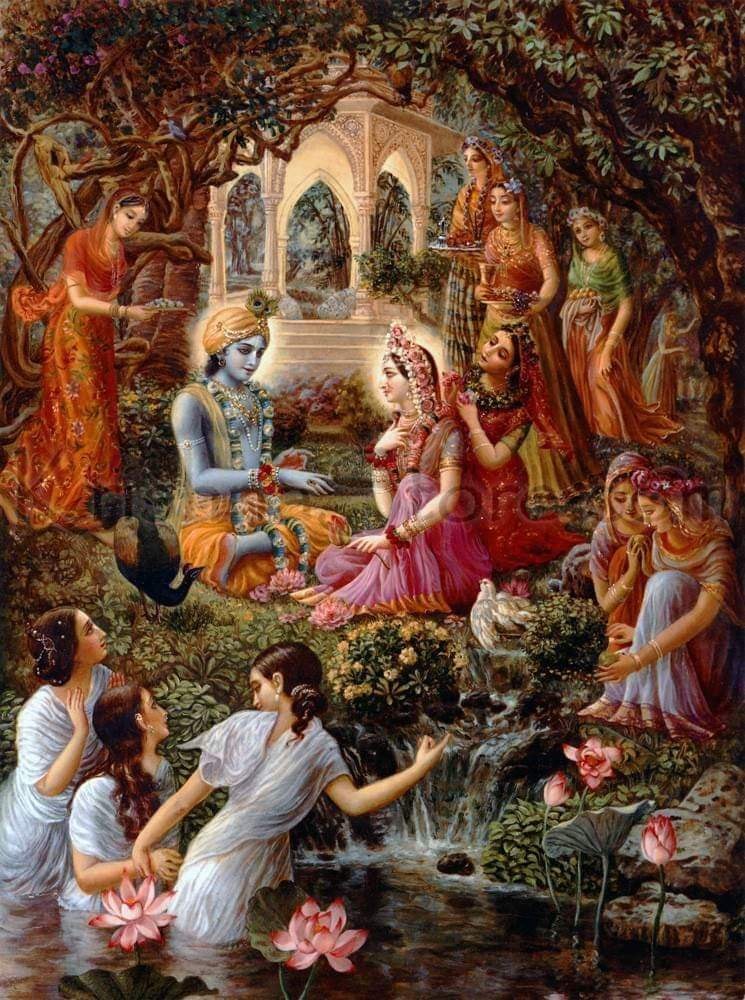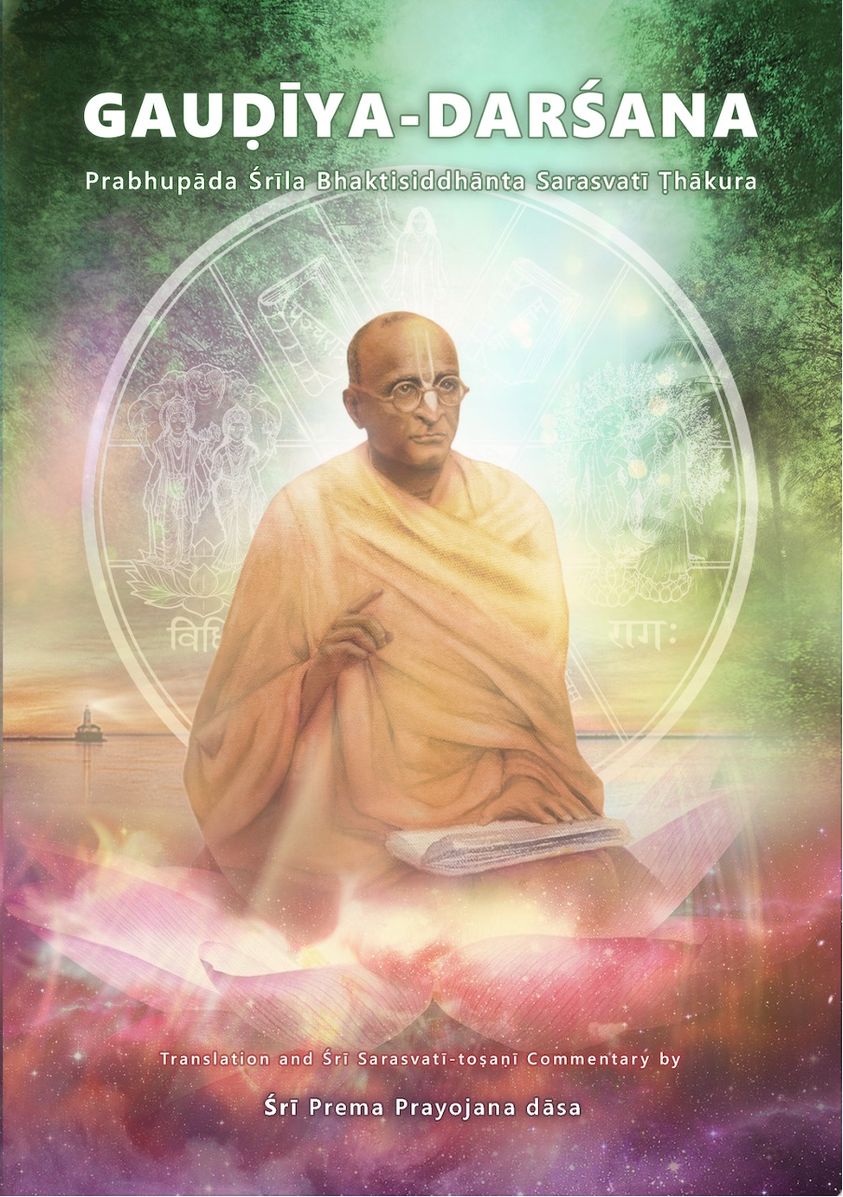An excerpt from Sri Tattva Viveka An Analysis of Western Philosophies by Sri Bhaktivinode Thakura
Srila Bhaktivinoda Thakura
I always found the following words from Srila Bhaktivinodha Thakura amusing, liberating and revealing and amazingly straight forward and completely to the point. His Book Sri Tattva Viveka An Analysis of Western Philosophies is brilliant and His other books like The Jaiva Dharma, translated by Srila Bhaktivedanta Narayana Maharaja are also truly wonderful treasure caves of unsurpassed knowledge and wisdom.
Sri Tattva Viveka
kecid vadanti visvam vai paresa-nirmitam kila
jivanam sukha-bhogaya dharmaya ca visesatah (24)
Translation
Some philosophers say God created this world in order to make a place where souls have an opportunity to enjoy happiness or become pious.
Srila Bhaktivinodhe Thakur
Commentary by Srila Bhaktivinode Thakur:
Some philosophers say God created this world to give us an opportunity to enjoy pleasures. They think that after sinlessly enjoying different luxuries and pleasures, people will praise God and perform pious deeds, praising God for his mercy towards them. However, if God really had wanted to create this material world for the soul’s pleasure then surely He would not have created it as it is. This world is a place full of problems, troubles and disasters. If we consider whether or not this world is a place of enjoyment, we cannot but think this world is filled with many horrible defects. God is all-powerful and whatever he wishes to happen is done at once, so surely he would have created the material world as something that functions in a better way if he was making a world where souls will enjoy pleasures. He would have made it as something faultless. And if he created the material world as a place for souls to perform pious deeds, then surely He would have made it very different from the way it is. Of this there is no doubt. Why is there no doubt of this? Because in the material world pious deeds are not easily performed by every soul.
adi-jivaparadhad vai sarvesam bandhanam dhruvam
tathanya-jiva-bhutasya vibhor dandena niskritih (25)
Translation
Some philosophers say that because of the first human being’s sin all the other human beings are imprisoned in the material world. Then, punishing Himself for their sins, God delivers the living entities from sin.(25)
Commentary by Srila Bhaktivinode Thakur:
Thinking about the virtues and faults of this world, some moralist monotheists have concluded that this material world is not a place of unalloyed pleasures. Indeed, the sufferings greatly outweigh the pleasures. They have decided that the material world is a prison created for the punishment of humankind. If there is a punishment, then there must be a crime that has been committed. Indeed if there were no crime then why would there be any punishment? What crime did the living creatures commit, that they are born into a world of suffering? Unable to properly answer this question, some men of small intelligence gave birth to a very wild idea. They imagine God created the first man and placed him in a pleasant garden with his wife. Then God forbade the man to taste the fruit of the tree of knowledge. Following the evil counsel of a wicked being the first man and woman tasted the fruit of the tree of knowledge, thus disobeying God’s command. In this way they fell from grace and were expelled from that garden and thrown into this material world which is filled with sufferings. Because of their offence, all other living entities are offenders from the moment of their birth. Not seeing any other way to remove this offence, God himself took birth in a human form. He took on his own shoulders the sins of his followers, and then died. All who follow him shall easily attain salvation, and all who do not follow him will fall into an eternal hell. In this way God assumes a humanlike form, punishes himself, and liberates humankind.
An intelligent person cannot make sense of any of this.
janmato jiva-sambhavo maranante na janma vai
yat-kritam samsritau tena jivasya caramam phalam (26)
Translation
These philosophers say that the soul comes into existence at birth. After death, he is not born again on earth. After death he attains either heaven or hell as a result of his actions in that one lifetime. (26)
Commentary by Srila Bhaktivinode Thakur:
To accept this concocted religion one must first believe in some rather implausible things. The living entity’s life begins at birth – before birth the living entity did not exist. After death, the living entity will no longer stay in the world of material activities. Only human beings have souls – other creatures have no soul. But only extremely unintelligent persons believe in this religion. In this religion the living entity is not an eternal, spirit being by nature. God has created the living entities out of matter.
Why are the living entities born into very different situations? Some are rich and healthy, some are poor and sickly. The followers of this religion cannot say. Why is one person born into a house filled with sufferings while another takes birth in a house filled with joys? One is born into the house of people devoted to God while another is born in a wicked atheist’s family. Why is one person born in a household where he is encouraged to perform pious deeds, and he then goes and performs pious deeds. But another person is born in a family of atheists and is placed in a situation where he is encouraged to sin? He sins and becomes bad, because of his circumstances. The followers of this religion cannot answer all these questions. Their religion seems to say that God is unfair and irrational, for it is God who decides what sort of life someone will have.
Why do they say that animals have no souls? Why don’t birds and beasts have souls like the human beings? Why do the human beings have only one life? Bcause of their actions in that one life people are rewarded with eternal heaven or punished with eternal hell. Any person who believes in a truly kind and merciful God will find this religion completely unacceptable.
atra sthitasya jivasya karma-jnananusilanat
visvonnati-vidhanena kartavyam isa-tosanam (27)
Translation
These people say that by doing work and by accumulating knowledge humankind can make improvements in the material world and in this way please God. (27)
Commentary by Srila Bhaktivinode Thakur:
The followers of this religion have no tendency to worship God selflessly. In general their idea is that by doing work and by gaining knowledge one should work to improve the material world, and in this way please God. By building hospitals and schools, and by doing various philanthropic works, they try to do good in the world and thus please God. Worship of God by performing work (karma) and by engaging in studies and learning (jnana) is very important to them. They show no capacity to understand pure devotional service (suddha-bhakti), which is free of fruitive work and philosophical speculation.
Worship of God done out of a sense of duty is never natural or unselfish. “God has been kind to us, and therefore we should worship Him.” These are the thoughts of lesser minds. Why is this not a good way to worship God? Because one may think, “If God is not kind to me, then I will not worship Him anymore.” In this way one has the selfish, bad desire to get God’s kindness in the future.
If one wishes that God will be kind by allowing one to serve Him, then there is nothing wrong with that desire. But the religion under discussion does not see it in that way. This religion sees God’s kindness in terms of one’s enjoying a happy life in this material world.

 Posted in
Posted in 







